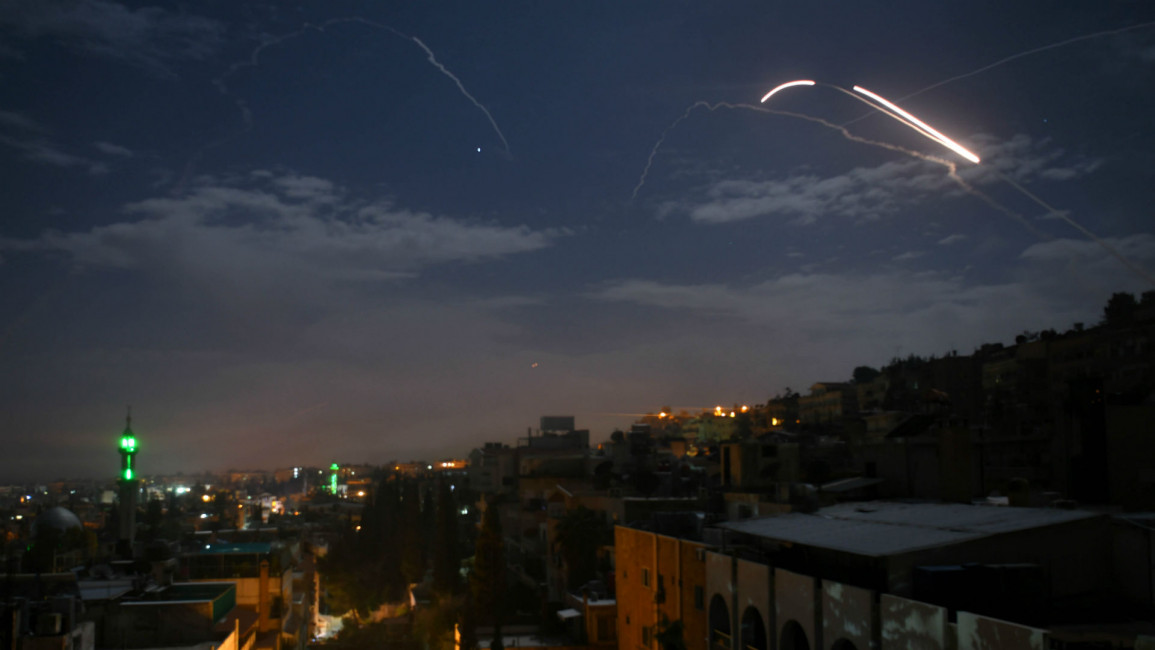Syria air defences intercept Israeli projectiles: state media
"Our air defence systems intercepted luminous objects coming from the occupied territories (Israel) and downed several of them," SANA said quoting a military source.
A later report described the projectiles as "hostile targets" which were fired "towards the province of Quneitra" near the Golan Heights, parts of which are annexed by Israel.
Earlier SANA reported a "loud explosion" around the capital Damascus.
The Britain-based Syrian Observatory for Human Rights war monitor said "three explosions" shook southwest Damascus on Friday.
"They were Israeli strikes that targeted the Kiswah region where weapons warehouses belonging to Iran and (its Lebanese proxy) Hizballah are located," Observatory head Rami Abdel Rahman told AFP.
Israel has carried out hundreds of airstrikes in Syria, most of them against what it says are Iranian and Hizballah targets.
In April, Syria said an Israeli airstrike targeted a town in central Hama province north of Damascus, wounding three combatants and destroying buildings.
State media at the time said Syrian air defences intercepted "some of the Israeli missiles".
In March, Syria accused Israel of having attacked targets just north of second city Aleppo, adding that it air defences had shot down several missiles, after a string of Israeli raids in January.
On January 12, 2019, Syrian air defences shot down Israeli missiles targeting a transport ministry warehouse at the Damascus international airport, SANA reported at the time.
Israeli Prime Minister Binyamin Netanyahu confirmed that strike and said Israel was "more determined than ever to act against Iran in Syria."
Just over a week later Israel announced its Iron Dome aerial defence system had intercepted a rocket fired from Syria by the Iranian Revolutionary Guards' Quds Force.
In response, Israeli fighter jets carried out further strikes inside Syria, targeting Iranian facilities and Syrian aerial defence batteries.
The Observatory said that at least 21 people, mostly Iranians, were killed in the January raids.
Israel insists that it has the right to continue to target positions in Syria held by Iran and its Lebanese ally Hizballah.
Netanyahu has vowed not to let Iran - which backs Syrian President Bashar al-Assad - entrench itself militarily in the war-torn country.
Gulf tensions
The latest report comes amid soaring tensions in the region between Israel's arch-foe Iran and the United States.
The stand-off had been simmering since the United States last year withdrew from the 2015 nuclear treaty which Iran reached with major world powers.
In recent days the US accused Iran of alleged threats and last week deployed an aircraft carrier group and B-52 bombers to the Gulf.
Iran had not made any direct public threats to spark the US deployment, but Washington says it acted on intelligence reports of Iranian actions.
On Friday, the deputy head of Iran's elite Revolutionary Guards said Iranian missiles can reach US warships in the Gulf, as tensions continued to rise between Washington and Tehran.
"Even our short-range missiles can easily reach (US) warships in the Persian Gulf," Mohammad Saleh Jokar, the Revolutionary Guard's deputy for parliamentary affairs, said, according to the semi-official Farsnews agency.
"America cannot afford the costs of a new war, and the country is in a bad situation in terms of manpower and social conditions," he added.
Iran has accused the United States of "psychological warfare" over the build-up of military forces, with foreign minister Javad Zarif saying there is "no possibility" of negotiations with the United States to reduce spiralling tensions.
Amid escalating tensions in the region, Zarif has called on the international community to save the nuclear deal, known as the Joint Comprehensive Plan of Action, or JCPOA.
Iran signed the deal with China, Russia, Germany, Britain, France and the United States. International sanctions were eased in return for curbs on Tehran's nuclear programme.
But last year President Donald Trump walked away from the accord. The US has since then slapped sweeping sanctions on Iran.
Follow us on Twitter: @The_NewArab



